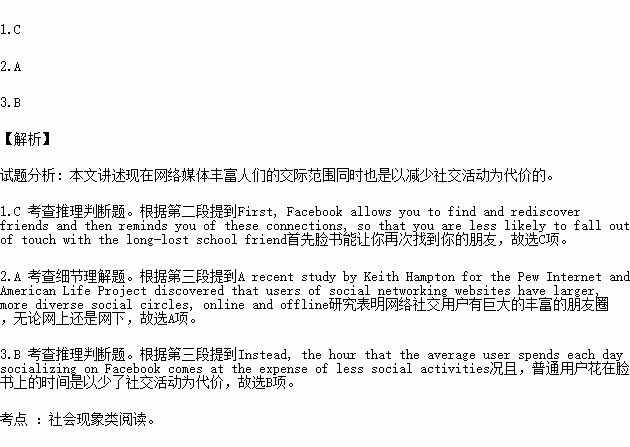题目内容
In the past, friendships were greatly limited by time, space and attention; increasing home and workplace mobility has made it even harder to keep social relations over time. Through a combination of user controls, new technologies and changing standards of social behavior, Facebook is freeing us from these limitations, making friendships more accessible, pleasant and diverse than ever before.
First, Facebook allows you to find and rediscover friends and then reminds you of these connections, so that you are less likely to fall out of touch with the long-lost school friend, or the family member in a different country. 'Second, Facebook creates an environment that allows you to interact easily with others : you can share your photos,videos,links and thoughts with your friends, and respond to what they share in turn. Third, Facebook’s unique technical system helps you to discover your friends,most valuable stories. These technologies allow people to keep and enrich friendships that they might otherwise have been unable to keep.
The effect of this is very great. A recent study by Keith Hampton for the Pew Internet and American Life Project discovered that users of social networking websites have larger, more diverse social circles, online and offline. This outcome comes at no cost to one’s closest relationships, which are kept in person and over the phone. Instead, the hour that the average user spends each day socializing on Facebook comes at the expense of less social activities, such as the three or so hours a day the average person spends watching television.
Time may limit our ability to keep social ties, but our desire for social communication is limitless. Just as boats have allowed us to cross oceans and vehicles have allowed us to move mountains, Facebook is a tool that allows us to stay more deeply connected with a larger and more diverse set of friends.
1. What can you do with the help of Facebook according to the text?
A. Protect the environment.
B. Find a new house or workplace.
C. Rediscover long-lost classmates.
D. Change the behavior towards your friends.
2. What will social networking websites do?
A. Increase the diversity of social relations.
B. Share the hours of watching television.
C. Restrict personal friendship.
D. Limit social activities.
3. What is the author's attitude towards Facebook?
A. Worried. B. Doubtful. C. Approving. D. Curious.

